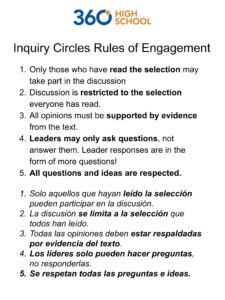 COVID19 has blanketed so many students and families in frustration, despair, and disappointment. Recently I visited 360 High School in Providence, Rhode Island and found hope, optimism, and a sense of possibilities. Started seven years ago with Carnegie Foundation money, this school of 300 students still believes that smaller is better. Under the leadership of Kerry Tuttlebee, the faculty has committed to placing inquiry at the center of all instruction.
COVID19 has blanketed so many students and families in frustration, despair, and disappointment. Recently I visited 360 High School in Providence, Rhode Island and found hope, optimism, and a sense of possibilities. Started seven years ago with Carnegie Foundation money, this school of 300 students still believes that smaller is better. Under the leadership of Kerry Tuttlebee, the faculty has committed to placing inquiry at the center of all instruction.
Posters in both Spanish and English grace the walls of every classroom, reminding students about the “rules of engagement” for inquiry circles. I particularly like #4: “Leaders may only ask questions, not answer them.”
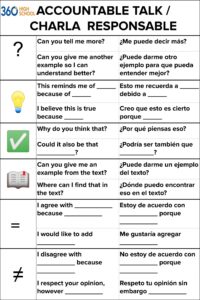 Another poster: Accountable Talk/Charla Responsible provides students with sentence stems to engage in Inquiry Circles. “Can you tell me more? Can you give me an example from the text? Where can I find that in the text?”
Another poster: Accountable Talk/Charla Responsible provides students with sentence stems to engage in Inquiry Circles. “Can you tell me more? Can you give me an example from the text? Where can I find that in the text?”
The most striking poster was about annotation. Specifically students were asked “as you read, mark the text.” Students had to “see, notice, describe, think, analyze, respond, connect and wonder, interpret, ask questions. As seen in the poster, they used specific punctuation or highlighting for each section. In English, Science and Math classes, that’s exactly what students were doing!
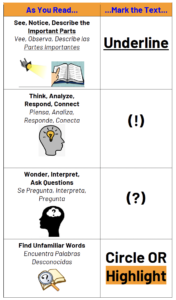 Two 11th graders poured over primary source documents about the American Dream, annotating. Their task was to analyze two difficult texts and then write their own analysis of whether the American Dream exists. I asked, “Can you tell me about your process?” One of the students responded, “I read carefully, and I make notes and that helps me understand better. Then, I begin my own essay.” He showed me the computer he was working on and how he began his paper by talking about the two authors. Perhaps what is remarkable here is that over 50% of these students are recent immigrants and English language learners. If I looked at their standardized test scores, I would be dismayed, but here they are focused in school and using academic discourse to engage in difficult texts.
Two 11th graders poured over primary source documents about the American Dream, annotating. Their task was to analyze two difficult texts and then write their own analysis of whether the American Dream exists. I asked, “Can you tell me about your process?” One of the students responded, “I read carefully, and I make notes and that helps me understand better. Then, I begin my own essay.” He showed me the computer he was working on and how he began his paper by talking about the two authors. Perhaps what is remarkable here is that over 50% of these students are recent immigrants and English language learners. If I looked at their standardized test scores, I would be dismayed, but here they are focused in school and using academic discourse to engage in difficult texts.
The teachers are also engaged and curious. Outside the classroom doors instead of college flags (which I hate) are QR codes linking to the book that the teacher is currently reading. In this class, it’s Sweetness of Water by Nathan Hale. (That’s on my list too!)
The students tell me that this curriculum is theirs. “Our teachers write the curriculum. But they pay attention to what we need and what we want to learn.” One student says that if he came back in four years, he wouldn’t expect to see the same curriculum. “It has to change with the kids. That’s the point. It’s got to be constructed in part with them.”
In conversation with a group of seniors, I asked what was working and what should change about their unique school. Our discussion began with a question about potential. “What does it mean to reach your potential—especially given that you’ve been out of school, due to Covid19, for almost two years?”
Ashley, a young woman with dark hair ringing her round face, said, “Here I can think about whether college is for me. That’s important. It’s talked about a lot, but I don’t feel I have to go to reach my potential. I want to go to cosmetology school. I would be good at that.” She feels that the school is helping her realize that goal.
Sean talks about how potential is the “best version of you. Not everyone’s the same and so we all have to live our own fullest life.”
And Jaiceli tries to remember a quote she learned in class. “When you’re 20, you care what everyone thinks. When you’re 40 you stop caring ….” She can’t remember the rest. Jashua and Jasalynn chime in. “You stop caring what everyone thinks, and when you’re 60 you realize no one was ever thinking about you in the first place.” The students aren’t sure who said the quote; someone says Winston Churchill, but the author seems less important than the meaning. Jaiceli says, “It just matters so much what everyone thinks about you right now.”
Angel disagrees with her. “But here it’s different. I don’t think it’s just about peer pressure. Here, teachers actually care about us. They give us feedback. And so do students. We are all expected to do that. We are challenged. Even when we are challenging.” There is some laughter. “Yeah, I was challenging,” he admits. “I was kind of a mess in 9th grade. I know I acted out. But teachers didn’t just kick me out. They called home, they emailed, they even visited my home. And they asked me to help design the school. No one had done that before with me.” Lots of heads nod around the table. I have the sense that Angel was a handful but has grown a lot.
Jashua offers, “This school is more about the community. Your health is the most important thing here. Of course academics are important. We are all learning, and we are learning creatively, but we have to be well. Every year is different. That’s good. Too often school is already done and students are just passing through. That doesn’t keep things fresh.”
Students had lots of ideas about how to keep things fresh. Here was their advice:
You have to cross boundaries between grade levels. Freshmen have to really know seniors. Seniors are the example for a strong culture.
- Teachers make the curriculum with one another and consult with students. There is two-way learning. Students know that teachers are learners, too.
- Students play a role in creating the schedule.
- When we introduce someone new, we say, “your voice matters.” No matter when you enter the community, you matter.
- Teachers always remind us to grow. No one wants to be stuck in cement.
- We don’t actually call our teachers “teachers.” They are learning facilitators. That changes a lot of things.
- We have competencies and a graduation profile. We all work towards mastery. (They are talking about “IPACE, the “360 Profile of a Graduate,” below.)
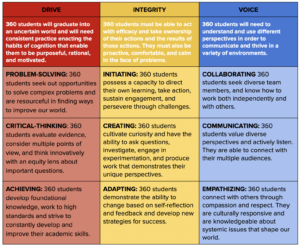
- No finals, but exhibitions of mastery.
- No dress codes. Why should it matter what you wear? Why should teachers police young people about clothing?
- Projects should be designed with students’ interest in mind.
- Partnerships matter; getting out of school building is key. School has to be about getting into the world. The world is hard and we need to learn that now with support
The adults, Kerry, the principal, and Ramiro, a lead teacher who had helped build Boston Arts Academy with me, talk about how hard it is to share power with kids. Ramiro says, “It’s easier to be dictatorial, but ultimately that doesn’t work. We have to have a mindset towards teamwork, and yet we can’t be superhuman.” Both talk about the power of the common approach towards reading through Inquiry Circles and annotation. Kerry adds, “Our kids carry the burden of not being strong readers yet. That’s a life and death thing. We must get them reading across all content.”
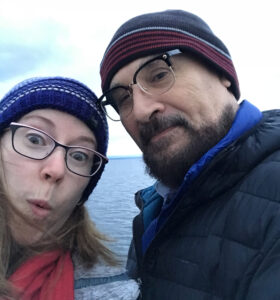 Kerry talked about how she wants to get results the “right way” and not with off the shelf curriculum that the district has purchased. “There is no panacea, no ‘right’ curriculum. This is hard work. But teachers and students have to be intellectually connected to the material. That’s what we are about here. That’s how we stay engaged.” She acknowledged that this does not happen overnight. “Our goal is metacognition. Young people have to know something about learning. They have to see what this is all for. That’s why we have these competencies.”
Kerry talked about how she wants to get results the “right way” and not with off the shelf curriculum that the district has purchased. “There is no panacea, no ‘right’ curriculum. This is hard work. But teachers and students have to be intellectually connected to the material. That’s what we are about here. That’s how we stay engaged.” She acknowledged that this does not happen overnight. “Our goal is metacognition. Young people have to know something about learning. They have to see what this is all for. That’s why we have these competencies.”
Ramiro reminded us, “School change doesn’t happen overnight. But, if teachers can treat students with respect, a lot of problems are mitigated.” Ramiro should know. He has helped to build so many powerful schools in his career.
I am grateful to Kerry, Ramiro, and their students for shining a light on what is possible in schools.
